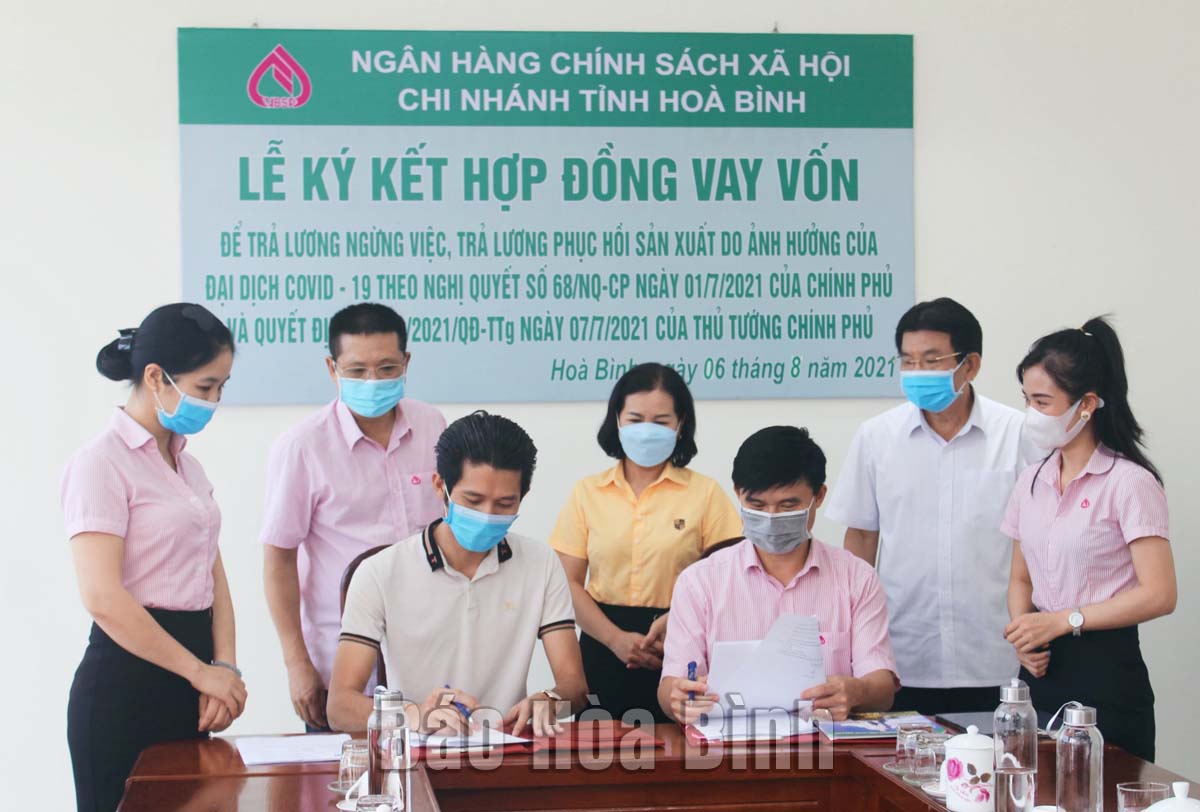
(HBO) – The COVID-19 pandemic has caused many businesses to go bankrupt or struggle with debt, and many workers to lose their jobs over the past two years. The pandemic has also severely affected the poor and disadvantaged groups in society.

The
Hoa Binh branch of Vietnam for Social Policies has recently signed contracts to
provide loans for three enterprises to pay wages for workers who have to stop
working due to the impact of the COVID-19 epidemic, and to restore production
in line with Resolution No. 68 of the Government.
Effectively implementing the "dual goal" of preventing and combating
the pandemic, protecting the people's health while resuming production, and
developing socio-economic in the new normal state - is the target set by the
Government for ministries, branches, and localities.
Recently, businesses and workers in the province are interested in the loan
package to pay salaries for employees who have to stop working and to restore
production. The Hoa Binh branch of Vietnam for Social Policies has coordinated
with relevant sectors to disseminate information on the package as well as
approached businesses to urgently implement the policy. However, only three
businesses in the province have so far received loans with a total amount of
more than 1.4 billion VND (61,330 USD).
The province currently has more than 3,000 enterprises with over 72,000
employees. Due to the impact of the pandemic, nine businesses had to suspend
operation and 75 enterprises had to let some of their employees stop working.
That figure showed that there is a high demand to access the support package in
the spirit of Resolution No. 68.
From the direction of the Prime Minister and the actual implementation of
social security packages in recent years, it can be seen that the
"timely" factor is still an unsolved issue. Thus, it is necessary for
competent agencies to carry out it faster and more responsibly so that the very
humane policy of the Party and State can be put into practice and many
businesses can benefit and receive more doses of "vaccines" amid the
complicated development of the pandemic. If enterprises are
"healthy", the country's economy will develop, workers will have jobs
and social security will be secured.
The Department of Education and Training of Hoa Binh province held a conference on March 18 to review the performance of the "Safe and Happy School" Project and set out tasks for 2025. The project, funded by the Taiwan Fund for Children and Families (TFCF), aims to create a safe, inclusive, and supportive learning environment for students. The event saw the attendance of representatives from the TFCF and 26 beneficiary schools.
With over 70% of their workers being women, trade unions across industrial parks (IPs) in Hoa Binh have been actively safeguarding their legal rights and interests while implementing initiatives to improve their income and well-being.
In recent years, the Hoa Binh provincial General Hospital has continuously innovated itself and improved the quality of medical services to meet the increasing needs of local people. With substantial investments in infrastructure and modern equipment, along with a team of highly qualified doctors and nurses, the hospital has gradually established itself as one of the leading medical units in the Northwestern region and a trusted destination for healthcare for people inside and outside the province.
From mastering the fundamentals of programming to achieving national recognition, the Programming Club of the Le Van Tam Primary School (STAR LVT28) in Hoa Binh city has made remarkable strides in the field of robotics.
The Ho Chi Minh Communist Youth Union Committee and the Vietnam Youth Federation chapter of Hoa Binh province organised a programme on March 12 to launch the "Digital Literacy" movement and an online quiz on the resolutions of the Vietnam Youth Federation congresses at all levels, as well as the Politburo's Resolution No. 57-NQ/TW on breakthroughs in the development of science, technology, innovation, and national digital transformation.
As climate change grows more unpredictable, the development of production forests has become essential - not just for economic growth, but for safeguarding the environment and maintaining ecosystem balance. By boosting local incomes, curbing natural disasters, preventing soil erosion, and protecting water resources, these forests play a crucial role in sustainable development.



